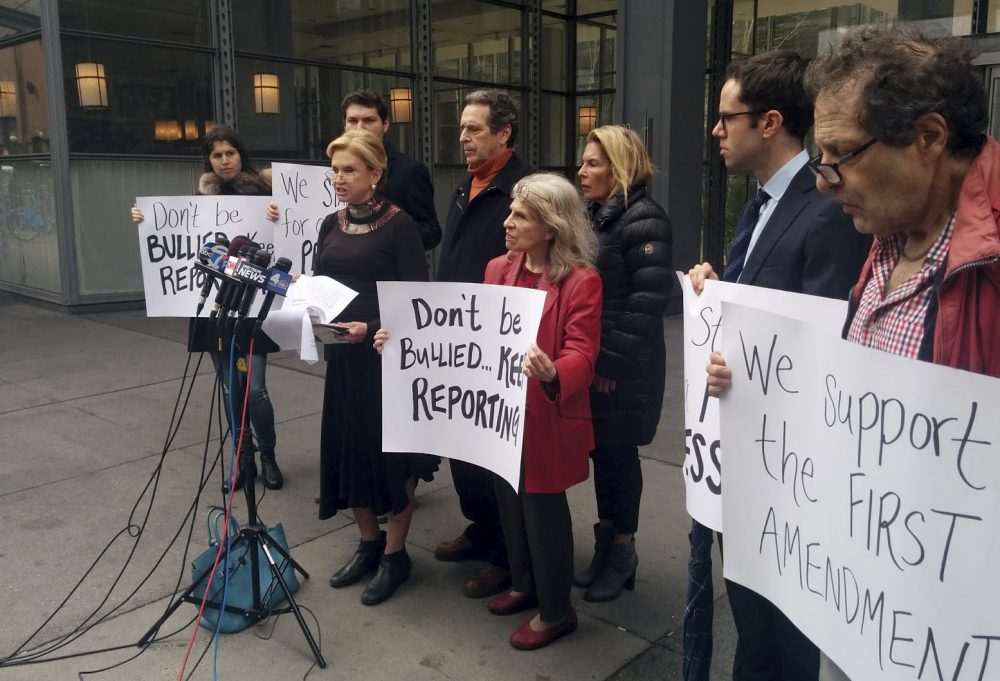Advertisement
COMMENTARY
Banned Friday, Bannered Sunday: Favored White House Press Should Share Reports

Scarcely a day goes by when President Donald Trump or his deputies don’t skewer reports by news organizations as fake, journalists as dishonest or the media as the opposition party. But it hasn’t stopped them. Many news outlets continue reporting very detailed information that has already shaped Trump’s nascent administration. This tension between the White House and the press is proving to be a bonanza for the public.
So when press secretary Sean Spicer barred several news organizations — including The New York Times, BuzzFeed News, CNN, The Los Angeles Times and Politico — from a scheduled off-camera briefing on Feb. 24, it seemed as though the public, too, was banned from the West Wing.
Two trusted news organizations — the Associated Press and Time — refused to take part in the briefing, aligning with their banned brethren. This initially seemed admirable, standing up to the administration’s favoritism and punishment. And it may have felt good for beleaguered journalists to rage against the Trump machine. But boycotts alone are ill advised because they don’t necessarily serve the public.
The purpose of the press is to inform. Instead of boycotting the White House, those who are the next flavor of the week should share their information with those who are in the doghouse, similar to the way a pool reporter shares notes with the other members of the pool. That way, everyone wins. Keep raising hell about being excluded, tell the public what happened, but keep on reporting.
The administration’s anger toward news organizations is so menacing that it begs the question: Would the White House ban new outlets completely?
Candidate Trump played his game of groans against the press during the campaign. He would exclude one organization for their reporting, the others would report it, and the news outlet was usually allowed back in. But last week’s exclusion was the first of his presidency. It won’t be his last. Some governments use these techniques to build their agendas. In addition to harassing and blacklisting media employees, administrations also cultivate sympathetic journalists, as the Trump administration has favored Breitbart and Fox.
Steve Bannon, Trump’s chief strategist, was narrowly correct when he said the media is Trump’s opposition (although the word media is far too broad), not because news organizations have some irrational animus against Trump, but because they serve as arbiters of facts. Without any candidates to check him, as they did during the presidential campaign, Trump’s frequently inflated claims float into the world unfettered. The press grabs his words, ties them down and holds a magnifying glass to them.
Bannon said the media should "keep its mouth shut and just listen." Trump called the press "the enemy of the people." The administration’s anger toward news organizations is so menacing that it begs the question: Would the White House ban new outlets completely?
Banned on Friday, bannered on Sunday. This is the conflicted relationship the Trump White House will continue to have with the press.
It’s possible the administration might try to do it for a day in a fit of pique. But it would likely not last longer than that. Such an act would be met with outrage by some Republicans, further advancing the split in the party. It would be roundly denounced by news organizations. Although the public tends to see the media as too hard on the president, that feeling could swiftly change if he disregards the First Amendment.
While the White House’s hostile tone toward news outlets is worrisome, both Bannon and Trump ultimately crave media approval too much to censor them. Both men are products of establishment organizations. Bannon served in the U.S. Navy, went to Harvard Business School and worked at Goldman Sachs. Trump graduated from New York Military Academy and the University of Pennsylvania. They are trying to change the world through the established channels of the U.S. government.
What they want more than anything is esteem, praise and respect from powerful news organizations. Just days after Bannon criticized the media as "corporatist, globalist elites," Breitbart, the right-wing news organization he used to run, posted on its website five paragraphs of an opinion piece in The New York Times analyzing Bannon's political vision.
The story was written by a senior editor of the conservative Weekly Standard, showing that even the Times, seen as liberal for its editorials, welcomes differing voices in the ongoing effort to understand this new administration. Banned on Friday, bannered on Sunday. This is the conflicted relationship the Trump White House will continue to have with the press. While undoubtedly stressful for both, it serves the public just fine.
